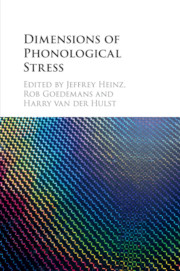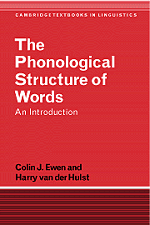Word Stress
Theoretical and Typological Issues
£36.99
- Editor: Harry van der Hulst, University of Connecticut
- Date Published: May 2019
- availability: Available
- format: Paperback
- isbn: 9781108718721
£
36.99
Paperback
Other available formats:
Hardback, eBook
Looking for an inspection copy?
This title is not currently available on inspection
-
Word stress has long presented challenges to phonologists, as they have sought to uncover patterns in its distribution, and devise models to account for its behaviour and formal representation both within single languages and cross-linguistically. In this collection, a team of world-renowned researchers present a variety of viewpoints on the methods and problems involved. Offering fresh perspectives on the topic and its study, this book is specifically concerned with basing theoretical work on broad typological surveys and focuses on the collection, selection and use of data in the analysis of word stress and word rhythm, including their phonetic manifestations. An extensive introduction presents a state-of-the-art review of stress research. The contributors also present StressTyp2, a project in an advanced stage of development, which intends to make publicly available information on word stress in a broad sample of languages and will offer new ways of understanding this key research area.
Read more- Gives a fresh perspective on the study of word stress and the key topics in this area
- World-renowned phonologists evaluate the current theoretical and typological issues, including methods of data collection and analysis
- Looks at a wide range of world languages including English, Dutch, French, Arabic, Hebrew and Turkish, as well as languages spoken in Papua New Guinea, Africa and the Pacific
Reviews & endorsements
'The book covers an unparalleled range of issues in word stress: what it is, how we best describe it and how we best analyze and represent it. It advances our understanding of word stress and everybody with an interest in linguistics should read it.' Ruben van der Vijver, Heinrich-Heine-Universität Düsseldorf
See more reviews'This edited volume is fascinating reading and brings together outstanding scholars to provide a solid and updated contribution to fundamental questions that pertain to the nature of stress. Its breadth and scope, the richness of the data explored, and the refreshing insights on metrical research will provoke both thought and discussion.' Anthi Revithiadou, Aristotle University of Thessaloniki
Customer reviews
Not yet reviewed
Be the first to review
Review was not posted due to profanity
×Product details
- Date Published: May 2019
- format: Paperback
- isbn: 9781108718721
- length: 384 pages
- dimensions: 180 x 250 x 20 mm
- weight: 0.7kg
- contains: 22 b/w illus. 26 tables
- availability: Available
Table of Contents
Part I. The Phenomenon of Stress:
1. The study of word accent and stress: past, present and future Harry van der Hulst
2. Do all languages have word accent? Larry M. Hyman
3. Disentangling stress and pitch accent: toward a typology of prominence at different prosodic levels Matthew Gordon
4. The separation of accent and rhythm: evidence from StressTyp Rob Goedemans and Harry van der Hulst
Part II. The Description, Selection and Use of Stress Data:
5. Evaluating evidence for stress systems Paul de Lacy
6. Convergence of prominence systems? Keren Rice
7. Rhetorical stress in Spanish José I. Hualde and Marianna Nadeu
Part III. The Analysis of Stress Types/Stress Phenomena:
8. Culminativity times harmony equals unbounded stress Jeffrey Heinz
9. Possible and impossible exceptions in Dutch word stress Carlos Gussenhoven
10. Symmetries and asymmetries in secondary stress patterns Brett Hyde
11. Representing rhythm Harry van der Hulst.
Sorry, this resource is locked
Please register or sign in to request access. If you are having problems accessing these resources please email [email protected]
Register Sign in» Proceed
You are now leaving the Cambridge University Press website. Your eBook purchase and download will be completed by our partner www.ebooks.com. Please see the permission section of the www.ebooks.com catalogue page for details of the print & copy limits on our eBooks.
Continue ×Are you sure you want to delete your account?
This cannot be undone.
Thank you for your feedback which will help us improve our service.
If you requested a response, we will make sure to get back to you shortly.
×








